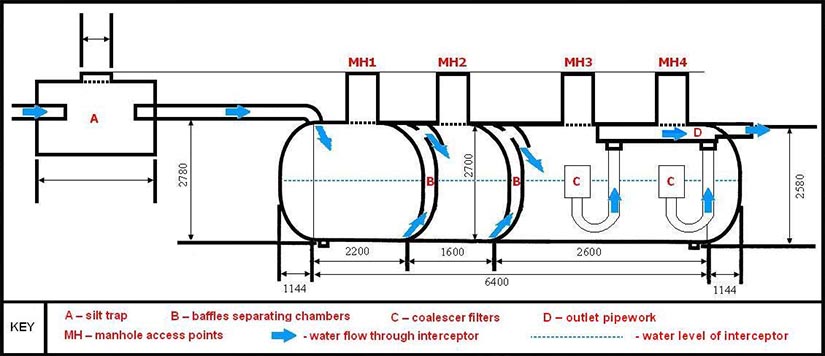Oil Interceptor FAQs

What is the difference between an oil interceptor and an oil separator?
Nothing, interceptor and separator are different terms for the same piece of equipment.
What is an interceptor?
Interceptors remove LNAPLS (Light non-aqueous phase liquids - mainly oils) and silt from drainage systems. Oil pollutants will float on the surface of the water and are retained for collection by a series of baffles that permit the water to pass up and over. Suspended solids are also a significant pollutant and are similarly retained within an interceptor as they settle out within the chambers.
To enhance performance interceptors may have special filters called coalescers that assist in removing the oil from the water phase and some interceptors may have automatic closure devices that shut down the system when there are high levels of oil. The functionality of these systems must also be monitored regularly if present.
Why would I need an interceptor?
An interceptor is required where certain activities may pose an unacceptable risk to the environment such that you may contravene UK legislation. Activities that pose such risks include:
- Production of trade effluent - e.g. from vehicle or parts washing, refuelling areas etc.
- Production of contaminated water – e.g. from car parks, roads and yard areas
- Identifiable generic risks – e.g. Bulk oil storage
For more information on why you would need an interceptor CLICK HERE
How do I choose an interceptor?
The selection should be based upon the British Standard BS EN858. The decisions are often dependent on site specific risks and sometimes complex, so may require the assistance of an expert. A baseline assessment will evaluate contaminant sources against the site drainage plan to establish the appropriate class, type and size of your interceptor.
For more information on choosing a suitably sized interceptor CLICK HERE
How much do interceptors cost?
Unfortunately there is no easy answer to this question.
The larger and more complex the systems the more expensive they will be, however the cost of installing an interceptor is likely to cost more than the interceptor itself. Generally for an interceptor install you would be looking at tens of thousands of pounds, this can be reduced if the install is conducted during the construction of a site rather than retrofit afterwards.
How do you maintain an interceptor?
To comply with the British Standard “experienced personnel” need to monitor your interceptor at least once every 6 months. Every 5 years the tank should be emptied and a structural integrity report should be conducted along with checking electrical and any other devices for functionality.
For more information on how often you should maintain your interceptor CLICK HERE
Extracts from legislation and guidance
"Install an oil separator
You may need to install an oil separator (interceptor) or other device to remove oil from water draining off hard surfaces, eg roads and car parks, or loading areas.
Typically a separator is needed for any site with a risk of oil contamination, such as:
- car parks larger than 800m2 in area or for 50 or of more car parking spaces
- smaller car parks discharging to a sensitive environment, such as a marsh that has been designated as a nature reserve
- vehicle maintenance areas
- roads
- refuelling facilities
The type and class of separator needed will depend on the activity and where the discharge is directed to.
Oil separators don’t work if there’s detergent in the water, e.g. from car washing. Use an alternative method such as a sealed treatment system, sustainable drainage system or waste removal service if necessary."
Environment Agency guidance - Pollution prevention for businesses
